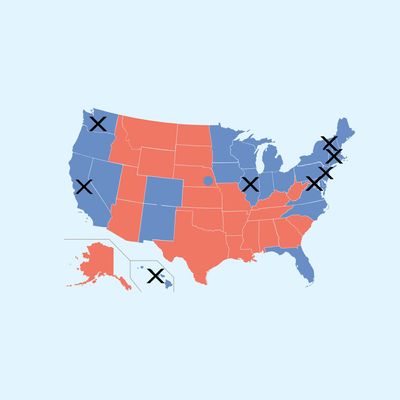
It is a well-understood consequence of the electoral college that only a handful of swing states ever play a central role in picking the president. This year, it’s no more than nine or ten. New York isn’t one of those swing states. It never is, and barring some seismic shift in the state’s demographics, it never will be. In other words, New York has no use for the electoral college. So why, for the third year in a row, will it decline to join the National Popular Vote Interstate Compact, an agreement between participating states to effectively supersede the electoral college by awarding their electoral votes to the whichever candidate wins the most votes nationwide?
In 2010 and 2011, the State Senate voted to join the Compact by overwhelming, bipartisan margins — 52-7 and 47-13, respectively. But the bill has never been brought up for a vote in the Assembly, and not because it suffers from a lack of support: When we reported on the bill last June, for example, it boasted 76 co-sponsors from both parties, a majority of the chamber. At the time, it appeared that Assembly Speaker Sheldon Silver’s personal opposition to bill was the main obstacle to holding a vote. “He has difficulty with the idea that presidential candidates don’t campaign in New York, so to that extent, he supports the idea of the legislation,” Silver spokesman Mike Whyland told us then. “Whether that actual legislation is the ultimate answer, I guess I would just say is unclear.”
But it seems that Silver has come around over the past year. He now “supports the bill,” Whyland told us yesterday. Nevertheless, as this year’s legislative session comes to a close today, there are still no plans for the bill — which now has 80 co-sponsors, up four from a year ago — to receive a vote. So what’s the hold up?
Whyland suggested that “some issues within the conference” are to blame. The bill’s lead sponsor, Bronx assemblyman Jeffrey Dinowitz, elaborates. “Generally speaking, they like to bring bills to the floor if they’re confident that it has 76 Democratic votes,” he tells us, referring to the number constituting a bare majority of the Assembly. “I’m not sure that we have 76 Democratic votes; that’s a little fuzzy at the moment. We certainly have a lot of Democratic votes. Whether it’s 76 or not, I’m not certain.” In other words, bipartisan majority or not, some Democrats aren’t thrilled with the idea of destroying the electoral college as we know it, and that’s apparently enough of a reason to forgo a vote entirely.
Dinowitz singled out two Democratic assemblymen in particular as the “loudest opponents” of the bill: Ways and Means chairman Herman Farrell, who represents Washington Heights, and Rochester-area Assemblyman Joseph Morelle. Dinowitz didn’t say what their complaints were specifically, but he did mention that “there are some people [in the Assembly] who are wedded to way things were done in the 18th century.” Dinowitz added that it’s a good thing that we no longer count African-Americans as three-fifths of a person; the electoral college is another tradition that could use an update for modern times. Messages left with Farrell and Morelle yesterday seeking comment were not returned.
So the National Popular Vote movement remains stalled in New York until either additional Democratic assemblymen get on board or Speaker Silver decides that making New York a relevant part of presidential politics is more important than respect for party cohesion. The votes of 7.5 million or so New Yorkers, once again, won’t matter this year. Maybe in 2016.





























